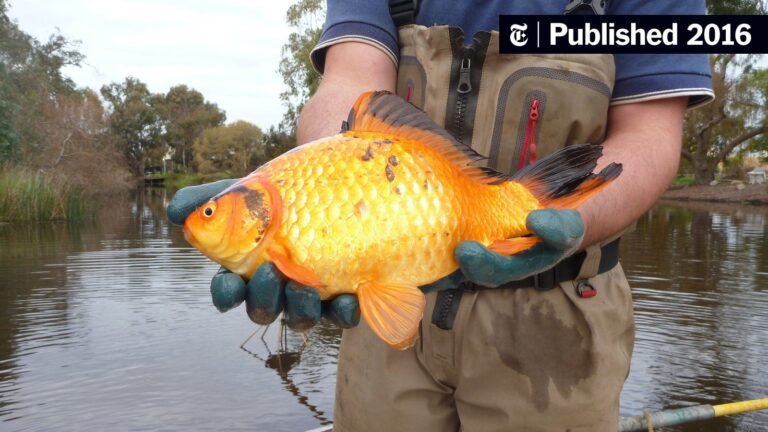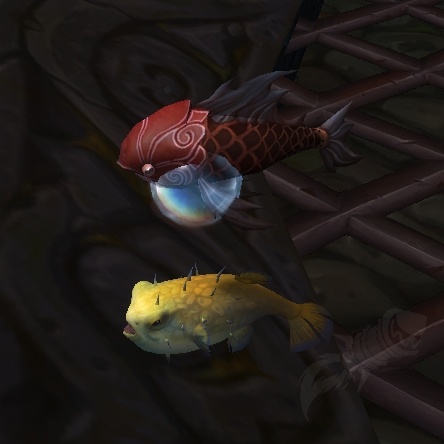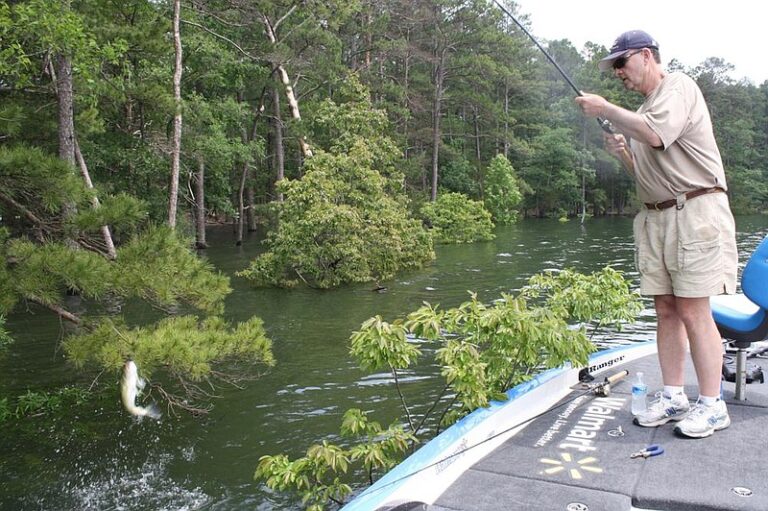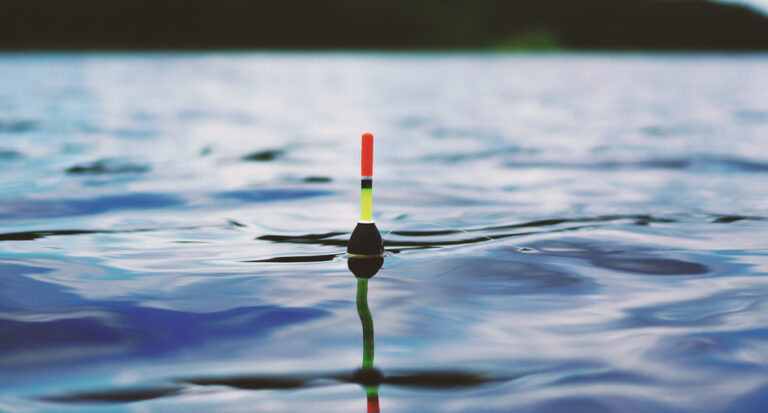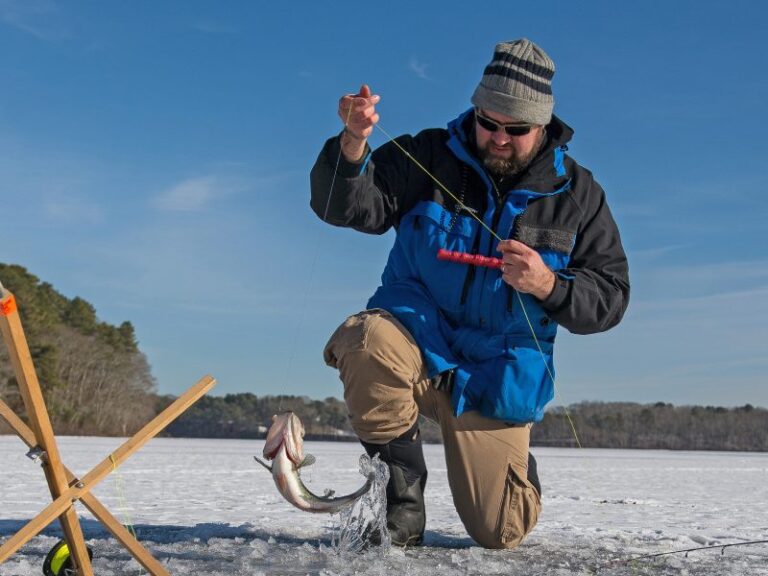Understanding pond ecosystems is crucial for better fishing. This can be achieved through a clear grasp of the relationships between living and non-living components within the pond ecosystem.
Ponds are unique aquatic ecosystems that support an array of life. From amphibians and fish to aquatic plants and insects, there are a variety of species that inhabit pond ecosystems. A pond’s ecosystem can be affected by a range of factors including water quality, climate, geography, and human activity.
Understanding these factors allows for better management and conservation of pond ecosystems, which can ultimately lead to improved fishing opportunities. In this article, we will explore the components of pond ecosystems with a focus on how they impact fish populations and fishing success. Whether you’re an experienced angler or a beginner, understanding this concept is important for optimizing your fishing experience.

Credit: www.mensjournal.com
Explaining The Relationship Between Pond Ecosystems And Fishing
Understanding Pond Ecosystems For Better Fishing
Do you ever wonder why some fishing trips are successful, while others are not? The answer could be as simple as understanding the pond ecosystem. From the weather to the aquatic animals, a pond ecosystem plays a significant role in a successful fishing day.
Discussing How Pond Ecosystems Can Impact Fishing Success
The pond ecosystem has a direct impact on the fishing success of any angler. Here are some key points to consider:
- The weather plays a significant role in the pond ecosystem. When it is too hot or too cold, fish don’t bite as much.
- The oxygen levels in the water can also affect fishing. When the oxygen levels are low, the fish are less active, making them harder to catch.
- The types of fish in the pond will also impact your fishing success. Different fish species have different behaviors, feeding patterns, and water depth preferences.
Analyzing How Understanding Pond Ecosystems Can Improve Your Fishing Technique
By understanding the pond ecosystem, you can improve your fishing technique and increase your chances of a successful trip. Here are some ways you can do this:
- Do your research ahead of time and find out what types of fish are present in the pond. Knowing the feeding patterns and water depth preferences of the fish can help you choose the right bait and location.
- Understanding the different insects and aquatic animals in the pond can also help you choose the right bait. Some fish species are more attracted to specific types of insects than others.
- Knowing the water temperature, oxygen levels, and weather conditions can help you plan your trips accordingly. For example, if the weather is too hot or too cold, you may want to fish during the early morning or evening when the water temperature is more suitable for fish activity.
Understanding the pond ecosystem is crucial for any angler. By considering factors such as weather, aquatic animals, and fish species, you can improve your fishing technique and increase your chances of a successful trip. So, the next time you plan a fishing trip, don’t forget to consider the pond ecosystem.
The Benefits Of Mastering Pond Ecosystems
Understanding pond ecosystems for better fishing: the benefits of mastering pond ecosystems
Fishing is a beloved pastime for many people. Getting outside, enjoying the fresh air, and hopefully catching some fish can be a great way to relax and unwind. However, as any angler knows, fishing isn’t always easy. Some fishermen have more success than others, and understanding the pond ecosystems can turn you from a novice angler to a successful one.
Here are the key benefits of mastering pond ecosystems through utilizing the following headings: highlighting the differences between successful anglers and novice anglers and emphasizing how mastering pond ecosystems can amplify your fishing expertise.
Highlighting The Differences Between Successful Anglers And Novice Anglers
Successful anglers understand the pond ecosystem and know where the fish live, what they eat, and how they behave. Novice anglers may cast their lines anywhere without considering these aspects. Here are the key differences between the two:
- Experienced anglers know where to find the fish while novice anglers are often clueless and waste time.
- Experienced anglers understand the feeding habits of fish while novice anglers don’t.
- Expert anglers are familiar with the equipment they need for various fish species while novice anglers often don’t take their equipment seriously and just go with whatever they have.
Emphasizing How Mastering Pond Ecosystems Can Amplify Your Fishing Expertise
Fishing ponds can be complicated, so it takes years of experience to learn how to succeed consistently. Becoming proficient in understanding pond ecosystems can elevate your fishing expertise and help you catch more fish. Here are the ways in which mastering pond ecosystems can amplify your fishing expertise:
- It allows you to select the right bait to catch the right fish for the pond ecosystem.
- Understanding the ecosystem helps you track the behavioral patterns of fish, such as when they feed and where they tend to group, enabling you to fish where they live and feed.
- When you have enough experience of understanding the pond ecosystem, you learn how to avoid spooking fish.
- Discovering the right rod, reel, and lure combinations for specific fish can give you an advantage over novice anglers lining the shore.
Mastering pond ecosystems is a key element for anglers if they want to be successful at fishing. Even though catching fish requires some skill and expertise, mastering the ecosystem can bring a new dimension of enjoyment and meaningful experience to the fishing sport.
Characteristics Of A Typical Pond Ecosystem
Understanding Pond Ecosystems For Better Fishing
As an enthusiastic angler, catching fish in a pond can be an exciting and satisfying experience. However, before casting your line, it is essential to understand the characteristics of the pond ecosystem to guarantee a successful catch. From identifying the ecosystem’s components to discussing their interaction, this post will delve into everything you need to know about pond ecosystems for better fishing.
Defining The Components Of A Pond Ecosystem
A pond ecosystem comprises living organisms and non-living elements interacting with each other. Here are the components of a typical pond ecosystem:
- Water: The water in the pond acts as the foundation of the ecosystem, influencing the growth of plants and other organisms.
- Sunlight: Sunlight plays a vital role in the ecological processes of the pond ecosystem, including photosynthesis and energy transfer.
- Inorganic substances: Mineral nutrients, such as nitrogen, phosphorous, and carbon, contribute to the growth of living organisms in the pond.
- Plants: Aquatic plants, such as algae, lily pads, and cattails, serve as both food and shelter for different species of fish and other aquatic animals.
- Animals: From insects, snails and mussels to fish and larger vertebrates, such as birds and mammals, the pond ecosystem is home to a wide variety of aquatic life.
Discussing The Interactions Between Different Components
The components of the pond ecosystem interact with each other in various ways. Here are the interactions between different components:
- Sunlight and water: Sunlight penetrates the water and influences the photosynthesis process of aquatic plants. The oxygen produced by the photosynthetic process is used by fish and other forms of aquatic life.
- Plants and water: Plants absorb water and inorganic substances from the pond and provide shelter and food to organisms present in the pond.
- Animals and plants: Many aquatic animals, such as fish, feed on aquatic plants. Similarly, different insects also pollinate the plants, increasing their growth.
- Water and inorganic substances: The pond’s water oxidizes inorganic substances, providing organisms with essential nutrients.
- Animals and water: Aquatic animals depend on the oxygen in the water for respiration, which is produced by the photosynthetic process of plants.
Understanding the pond ecosystem’s characteristics is essential for successful fishing. Keeping track of the ecosystem’s components and their interactions can help you identify the best places for fishing and even the type of bait to use. With this knowledge, you are now equipped to make the most out of your next fishing experience in a pond.
The Importance Of Water Quality In Pond Ecosystems
Ponds are among the most popular locations where anglers catch fish. These pockets of water magnify a recreation area’s natural beauty while providing a stupendous setting for fishing. To maintain fish health and population growth in a pond, it’s necessary to comprehend its ecosystem.
The quality of water is paramount in this context, and this article will explain why.
Discussing How Water Quality Impacts A Pond Ecosystem
Water quality encompasses a wide range of characteristics, including physical, chemical, and biological parameters. The quality of water in the pond ecosystem has a significant influence on fish population growth and the ecosystem’s health. The following are some key points to consider:
- Poor water quality is a primary cause of fish deaths in most ponds. It can pose an immediate threat to fish health and, consequently, threaten the overall health of the pond ecosystem.
- Changes in ph, temperature, and dissolved oxygen (do) levels can trigger harmful algal blooms, produce excess nutrients, and result in fish kills.
- A balanced pond ecosystem maintains a water quality indicative of a healthy system. Such ponds are characterized by clear water, healthy fish population, robust plant growth, and other attributes that suggest a well-functioning and healthy aquatic ecosystem.
Analyzing The Impact Of Different Pollutants On Fish Health And Survival
Different pollutants pose different hazards and threats to fish health. Below are some of the most common pollutants that can impact fish health and survival:
- Nutrient pollution, such as nitrogen and phosphorous, can lead to excessive plant growth, algal blooms, and reduced oxygen levels, which can stress fish and lead to death.
- Heavy metals, such as lead and mercury, can harm fish by impairing metabolic processes and causing behavioral abnormalities.
- Chemical pollutants, such as pesticides and herbicides, can have toxic effects on fish, leading to death or sublethal effects such as reduced growth, reproduction, and immune function.
It is critical to manage water quality in ponds, and it should be a primary concern of the pond manager and recreational users. By maintaining good water quality, pond ecosystems can sustain essential fish populations and support other aquatic organisms.
Factors That Affect Pond Ecosystems
Understanding Pond Ecosystems For Better Fishing
Fishing in a pond is an excellent way to spend a relaxed afternoon. Whether you are a beginner or an experienced angler, a successful catch still requires some knowledge about pond ecosystems. Knowing the factors that affect the pond’s ecosystem can help you catch more fish.
Here’s what you should know.
Discussing The Impact Of Weather And Climate On Pond Ecosystems
Weather and climate play a significant role in determining the pond’s ecosystem. Changes in temperature, sunlight, and precipitation affect the water, aquatic plants, and fish. Here’s how:
- Temperature: Fish species have different preferences when it comes to water temperature. Extreme temperature changes can cause stress to fish, causing them to seek refuge in deeper waters or near structures.
- Sunlight: Sunlight helps aquatic plants grow and release oxygen into the water. It also affects the water temperature and clarity. Limited sunlight can result in slower plant growth, and an overabundance of sunlight can trigger algae growth, which can deplete oxygen levels and harm fish populations.
- Precipitation: Rainfall and runoff can add nutrients to the water, promoting the growth of vegetation and algae. However, if the amount of precipitation is too high, it can cause flooding, erosion, and even damage to the pond’s ecosystem.
Analyzing The Human Impact On Pond Ecosystems And Fish Populations
Human activities have a considerable impact on pond ecosystems and the fish populations within them. Pollution, construction, and fishing pressure can cause irreversible damage. Here’s how:
- Pollution: Chemical pollutants such as fertilizers and pesticides can run off into ponds, causing algae blooms and depleting oxygen levels.
- Construction: Building near a pond can affect the water quality and clarity, which can harm fish populations. Land development can also change the landscape and soil composition, altering the pond’s ecosystem.
- Fishing pressure: Overfishing can deplete fish populations, affecting the pond’s ability to sustain itself. Additionally, using inappropriate fishing techniques or equipment can cause unintentional harm to fish and other aquatic life.
Understanding the factors that impact pond ecosystems is crucial to successful fishing. Remember, responsible angling means taking care of the pond’s ecosystem and preserving it for future generations.
Identifying The Key Components Of A Pond Ecosystem
Ponds are repositories of life, where various species interact with each other to form unique ecosystems. As an angler, understanding the pond ecosystem’s components will not only expand your knowledge but also improve your fishing success. In this blog post, we’ll discuss how we can identify the different components of a pond ecosystem and analyze how each component impacts fishing success.
Teaching Readers How To Identify Different Components Of A Pond Ecosystem
To understand the pond’s ecosystem, we need to identify various components that form it. Here are some of the key components:
- Aquatic plants: Plants growing underwater are a vital part of a pond’s ecosystem since they not only produce oxygen but also provide shelter and food for fish and other aquatic creatures. Some of these plants include submerged plants, floating plants, and emergent plants.
- Phytoplankton: These tiny green organisms are at the base of the food chain and provide food for zooplankton, which, in turn, are consumed by small fish.
- Zooplankton: These are the animals suspended in the water, feeding on the phytoplankton. They, in turn, become food for small fish.
- Insects: Various insect species, including dragonflies, damselflies, and mayflies, rely on ponds for their survival. They are a crucial food source for fish, making them an essential component of the pond ecosystem.
- Fish: Fish are the most visible component of the pond ecosystem. They are at the top of the food chain and consume other smaller creatures.
Analyzing How Each Component Impacts Fishing Success
Knowing the components of a pond ecosystem is essential since each component has ripple effects on other species. Here’s how each component impacts fishing success:
- Aquatic plants: The presence of aquatic plants in a pond has a positive impact on fishing success since they provide shelter for fish, increasing the chances of catching a larger fish.
- Phytoplankton and zooplankton: These primary producers at the base of the food web are excellent food sources, leading to robust fish populations in the pond.
- Insects: Fish consume insects found in the pond. Therefore, the presence of insects in the pond directly correlates to increased fish populations.
- Fish: The success of our fishing largely depends on the fish populations present in the pond. Different species have different preferences and behaviors, making it crucial to understand how to catch each type. Additionally, the size of fish populations in the pond can determine the overall success of a fishing trip.
Understanding the various components of a pond ecosystem and how each impacts fishing success can help us become more effective anglers.
Tips For Analyzing And Interpreting Pond Ecosystems
Understanding Pond Ecosystems For Better Fishing
Pond fishing is a relaxing and rewarding activity for many anglers. Yet, some people end up catching nothing, while others seem to have impressive catches every time. The secret to catching more fish lies in understanding the pond ecosystem. Analyzing and interpreting a pond’s environment can make a significant difference in your catch.
We will discuss the importance of analyzing pond ecosystems before fishing and teach readers how to interpret pond ecosystem data to improve their fishing technique.
Discussing The Importance Of Analyzing Pond Ecosystems Before Fishing
Understanding the pond environment before you start fishing can help you to make informed decisions about your fishing technique. It helps you to understand the habitat of the fish and their feeding patterns.
Some key points to consider before starting:
- Checking the water temperature, oxygen levels, and pollution level can help you get a better understanding of the pond’s environment.
- Analyzing the pond structure can help you understand the habitat of the fish.
- Knowing the types of aquatic plants and animals in the pond can help you select the right bait and fishing technique.
Teaching Readers How To Interpret Pond Ecosystem Data To Improve Their Fishing Technique
Interpreting pond ecosystem data can be challenging for beginners. Here are some tips to help you get started:
- Fish location: Knowing where the fish are in the pond can increase your chances of catching them. Keep track of the water temperature, time of day, and weather conditions when you had a successful catch.
- Understanding aquatic plants: Aquatic plants provide shelter and cover for fish, so knowing their location can help you to identify the areas where the fish might be hiding.
- Knowing the types of fish: Different types of fish have different feeding habits. Knowing what types of fish are present in the pond can help you to choose the right bait and technique.
- Water quality: Monitoring water quality can help you to identify the best time of the day to fish. Some fish are more active when the water is rich in oxygen, and others prefer still water.
- Understanding predator-prey relationships: Knowing what type of fish predates on other fish in the pond can help you to select the right bait.
Knowing how to analyze and interpret pond ecosystem data before fishing can significantly increase your chances of catching fish. By understanding the pond environment, you can tailor your bait, technique, and equipment to match the fish’s feeding habits and habitat.
So, take the time to analyze and interpret the pond environment, and you will soon be catching more fish.
Techniques For Using Pond Ecosystems To Catch More Fish
Understanding Pond Ecosystems For Better Fishing
Fishing in ponds can be a bit different from fishing in rivers or lakes. To increase your chances of getting a good catch, you need to know and understand the pond ecosystem. We will delve into the techniques of using ponds ecosystems to help you catch more fish.
The Benefits Of Understanding Pond Ecosystems
Knowing the pond ecosystem helps you predict the ideal conditions for a good catch. there are many benefits to understanding the pond ecosystem. Here are some of them:
- Understanding the food chain will enable you to use bait that targets specific fish.
- Knowing the depth of the pond will help you determine the type of lure and what fish species to target.
- Understanding the water temperature will guide you on when to fish.
- Knowing the structure of the pond will help you identify fishing spots.
Using The Pond Ecosystem To Your Advantage
Now that we know the benefits of understanding the pond ecosystem let’s look at practical ways of using the ecosystem to enhance your fishing technique:
- Study the pond’s bottom structure to know where to locate the fish. Fish such as catfish and carp prefer bottom-feeding, so casting your bait near the bed of the pond will increase your chances of getting a bite.
- Use different techniques for different water depths. Fish species such as sunfish and largemouth bass prefer shallow water. On the other hand, fish like trout prefer deeper water. Know the fish species and cast your line accordingly.
- Use different lures targeting various fish species. If you know the type of fish you’re catching, it’s easier to target the right fish species. Use jigs when targeting bass and spinners for trout.
- Time your fishing according to the season. Fish species like bluegills, crappie and catfish are more active during spring and summer. On the other hand, trout and walleye prefer colder temperatures, and fall is usually the best season to catch them.
Understanding pond ecosystems will enhance your fishing techniques. Knowing water depth, temperature, the pond structure, and the right bait and lures will help you target different fish species. Additionally, using the ecosystem will not only increase your chances of catching more fish but also make your fishing experience more memorable.
So, head to your favorite pond, use these tips to your advantage and enjoy your fishing adventure.
The Importance Of Understanding Pond Ecosystems For Successful Fishing
Understanding Pond Ecosystems For Better Fishing
Fishing can be a fun and rewarding activity, and part of the joy comes from the thrill of the catch. However, for many anglers, catching fish is not always easy. To be a successful angler, it is essential to understand the pond ecosystem thoroughly.
Therefore, let’s delve into the importance of comprehending pond ecosystems for successful fishing.
Recapitulating The Importance Of Mastering Pond Ecosystems For Successful Fishing
Mastering pond ecosystems means understanding the interconnectivity between the various factors that influence fish behavior, growth rates, and general well-being. Several pond organisms and environmental factors can affect fish growth rates, such as:
- Temperature
- Dissolved oxygen levels
- Water depth
- Nutrients present in the water
Furthermore, the food chain in ponds is complex, and anglers will need to understand the feeding habits of both the target fish species and their favored prey to be successful.
Analyzing How Pond Ecosystems Can Help Anglers Catch More Fish
The following are some critical reasons why understanding pond ecosystems is essential to catching more fish:
- Location: Knowing the water depth, oxygen levels, and temperature of a pond’s water helps anglers identify the best spots to fish.
- Bait selection: By understanding the feeding habits of targeted fish species, anglers can choose the proper bait to increase the chances of catching fish.
- Time of day: Knowing when fish are the most active can significantly increase the chances of catching fish.
- Lure selection: Based on fish species, size, and behavior, anglers can choose the correct type of bait for successful fishing.
- Weather patterns: Weather patterns such as wind direction and precipitation can influence fish behavior. Understanding how weather patterns impact pond ecosystems can help anglers make informed decisions about when to fish.
By comprehending the intricacies of pond ecosystems, anglers can improve their chances of catching fish. Being informed about the factors that influence fish behavior, feeding habits, and environmental conditions will help anglers to make well-informed decisions. Therefore, it is essential to continually research and educate oneself on the various factors influencing pond ecosystems to become a successful angler.
Conclusion
As anglers, understanding pond ecosystems is crucial in catching the biggest and best fish. From the water temperature to the types of plant life, every component plays a role in fish habitat and activity. By paying attention to these factors, fishermen and women can improve their chances of success on the water.
Additionally, maintaining the health of a pond’s ecosystem is essential for the overall welfare of the environment and its inhabitants. This includes keeping the water clean and clear, preserving natural plant life, and avoiding introducing invasive species. With a better understanding of pond ecosystems, anglers can not only improve their fishing experiences but also help to promote a healthy and thriving environment for all aquatic life.
Remember to take care of your local ponds and practice responsible fishing techniques to ensure that these ecosystems stay intact for generations to come.

